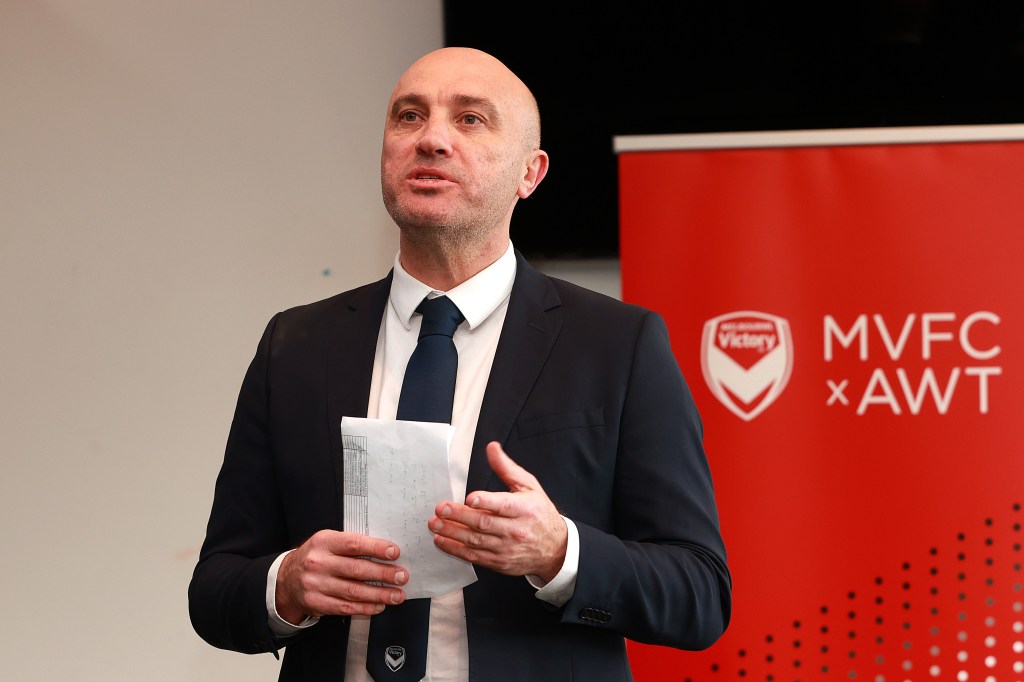When it comes to data and recruitment in football, there is no cheat code.
There’s no silver bullet. No way to get it right every time.
However, thanks to an Australian solution which is gathering steam across Europe, there is a platform that offers clubs, sporting directors, coaches, scouts and players an accessible way to retrieve, interpret and implement analytics more intuitively than ever before.
Traits Insights, created by Melbourne’s Dan Pelchen – a former data scientist at Collingwood Magpies and Chelsea – not only translates complex information from all facets of the game into a digestible format, it also allows clubs to feed in exactly what they are looking for in a player to identify those who best fit the bill from hundreds of leagues across the world.
Two years on from its official launch, Traits boasts a growing roser of top tier European clubs among its clientele, including the likes of Club Brugge, Legia Warsaw and renowned Australian coach Joe Montemurro’s Olympique Lyonnais.

It has welcomed investment by APEX Capital, a conglomerate of athletes that includes the likes of Trent Alexander-Arnold, Raphael Varane, Christian Eriksen and John Stones among other high-profile footballers, and boasts a board featuring high-profile Aussies such as Darren Burgess (ex-Liverpool & Arsenal) and Ged Roddy MBE (FIFA & ex-Premier League).
Among the first to get their hands on the platform was Melbourne Victory’s Director of Football John Didulica, who has been a ‘sounding board’ for Pelchen along the Traits journey.
“What I really loved about it from the start was that it’s very qualitative,” Didulica explained to aleagues.com.au.
READ MORE
‘THEY’RE MY HEROES’: Powerful reason behind new City star’s 15-year journey
TOTAL A-LEAGUES: New role could solve Mata debate; possible Bruno destination
FEATURE: Inside Muscat’s historic Shanghai triumph
INS & OUTS: Two huge inclusions for City ahead of Ninja A-League R4
“A lot of the data we looked through was two dimensional, we were relying on other people’s perceptions to make conclusions, whereas the real benefit that Traits has, it allows you to design what you’re looking for in players, and then the data plugs into that, so it gives you a better gauge of how closely potential players align with what you’re looking for.
“… So if we’re after a defender who could play the ball out really well, or a striker who could press really well, we had a vision in our head of which player did well based on the data we had, but then we could overlay the incoming players against that, and that was really informative.

Didulica has seen first-hand the power of the platform and the edge it can give A-Leagues clubs, in particular, in a challenging marketplace where scouting networks are not nearly as plentiful and a salary cap creates a unique environment.
The platform allowed his football department to swiftly cut through the huge number of players offered to the club to find the ones who really fit into the profile desired.
“What Traits has done is aggregate so many data sets that you can manage it with one person, so you no longer need to have this really deep network or deep pools of resources to identify who’s playing and track those players, because it does it all for you,” Didulica said.
“It really helps you get your arms around more players and many more games than was otherwise possible and as an A-League club, that’s really valuable because you don’t have the resources to either buy all those resources, employ those resources, or manage all those resources. So that’s really great.
“… It’s a bit of all or nothing in the A-League, in that if you only get a certain number of cards to play, and if those players don’t fit what you’re after, it has a disproportionately large impact on how you perform in any given season.
“Now, sometimes that comes down to luck, because the player you sign might get injured, and you lose that player. But if you contrast that to leading clubs in Europe, they normally have a range of highly accomplished players for every position.
“… We don’t really have that luxury in the A-league, particularly with our foreign players. If you’re signing somebody at a certain price point, they’ve got to be able to deliver what you’re after, or your team suffers significantly.
“So I felt the Traits tool really helped us remove a lot of risk from the signings we ultimately made, and certainly allowed us to make it in a really informed way.
“Not just for the coaches, but also for the board, because ultimately, people who are putting money into the club need to be satisfied that the players coming in have been properly scouted and assessed, and they’re actually aligning with the football vision everybody’s trying to get excited about.”
While Victory did not make a swathe of foreign signings this season, given they already boasted a squad coming off a Grand Final appearance, the recruitment of Greek striker Nikos Vergos was vetted using Traits.

Across his first six competitive matches for the club, Vergos contributed three goals and two assists in the Australia Cup and scored on his full Isuzu UTE A-League debut in the 3-1 derby win over crosstown rivals Melbourne City.
While Traits is a tool primarily used by football experts like Sporting Directors, Heads of Recruitment, coaches and scouts, among its main selling points is the way the platform can help translate reams of information to make it digestible for club boards to understand the profile of players they are sanctioning spending on.
In fact, aleagues.com.au got hands on with the platform, and at times it felt more like playing a real-life video game than doing scouting and analysis.
Traits doesn’t just service the Isuzu UTE A-League either; it also comprises data from the Ninja A-League as well as National Premier Leagues from across the country, allowing clubs – both domestic and overseas – to identify emerging talents from across the nation.
“Foreign clubs are looking at Australian players,” Traits founder Dan Pelchen told aleagues.com.au.
“The way that we usually run our pitching process is we’ll give clubs access to the tool or run them through a demo where they can drive it for themselves – and what naturally tends to happen is that when they’re speaking to an Aussie on the call, they’ll often take a look at the A-League and say, ‘show us these particular players’.
“Usually, scouting departments have a pretty targeted focus on particular markets, based on where they are in Europe or what demographic they’re looking at, however a platform like Traits is a huge enabler to looking through a far broader lens while maintaining a strong focus on what you’re actually searching for.
“That’s where, in recent times, there’s been more and more exposure to players in the A-League, just simply through data and what that actually means in terms of the visibility of players.
“Tools like Traits are really good at making that a straightforward process so that when clubs are looking at Aussie players and the top talents here, they’re doing it with a very targeted focus of understanding which ones are actually going to be a good selection for their team, or ones that fit the criteria of what it is that they’re looking for relative to position.
“Hearing the way in which clubs have engaged and the questions that we ask around what recruitment processes look like from one club to the next, has been super insightful to the way in which Australians are getting on the radar more which is largely in part to the availability of and the way of working that is really emerging within the industry.
“The flow on effect of that, from a domestic perspective, is the ability for A-League teams to actually start looking broader and further, even within their own domestic landscape as well.”
Didulica agreed: “One of the huge benefits … is the breadth of the information and the quality of it is because it throws its arm around the Australian NPL.
“We can form a pretty clear view about which players are doing well, what the attributes of these players are and how closely they might align with the attributes that we’re looking for.”
Indeed, where players excelling at lower levels of the Australian football pyramid may in the past have been in danger of missing the boat on a professional opportunity, clubs can now identify gems who are emerging with unique skill sets at all levels of both the men’s and women’s games.
The depth of the data also allows them to look beyond surface level metrics like goals and assists to find players who are standing out with far more nuance or in less glamorous roles, without the need for a large scouting operation.
But how does that differ from how clubs are using the platform internationally?
“One of the things that we’ve found is there’s not necessarily a uniform approach to how Traits is being used within clubs, from the biggest of big, Premier League clubs to some relatively small European clubs or or anything in between,” Pelchen explained
“There are some very different approaches to how Traits is being implemented within club’s and enhancing their existing talent ID and development processes. But with Victory, what I see being done really well is the way it actually touches quite a number of different areas of the club and how different demographics of users are engaging with the platform.”





